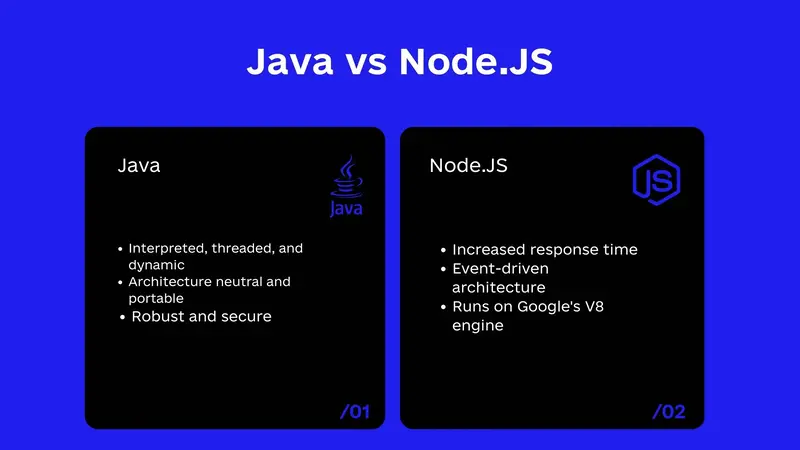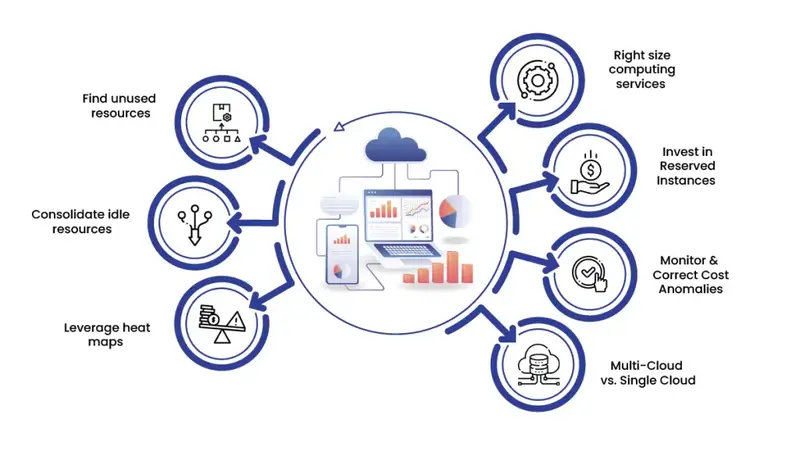The right choice of technology stack plays a key role in the success of the project. Among the most popular solutions for creating web applications, server platforms, and other solutions, Node.js and Java are often singled out. When using software development outsourcing services, companies need to choose the most suitable technology to achieve the optimal balance of speed, reliability, and efficiency. In this article, we offer a comparison of the features of Node.js and Java.
What is Node.js?
Node.js is an open-source, cross-platform framework used to create JavaScript-based programs that can run outside of a web browser. The core of Node.js, JavaScript, is one of the most robust programming languages that developers use for both backend and frontend tasks.
Software solutions built with Node.js are easier and cheaper to develop and maintain because a single stack is used for all their components – both for the server and for the user part.
Advantages of Node.js
It is impossible to overestimate the influence of Node.js as a technology for web development because it is used in many well-known applications and platforms. Let’s look at its key benefits that will provide you with a better understanding of this popularity
High performance.
Node.js uses Google’s V8 engine, which automatically converts JavaScript into machine code. This has a positive effect on the performance of solutions created with its help, which can be explained by the fact that V8 optimizes the processing of instructions, making their execution almost instantaneous.
Easy application creation
Thanks to the use of JavaScript, Node.js makes the process of developing server applications intuitive and adaptable. It significantly simplifies the description of the interaction processes between the front end and the back end due to the ability to use the same programming language, namely JavaScript.
Node Package Manager (npm)
npm is considered one of the largest package managers in JavaScript, which contains hundreds of thousands of ready-made solutions for any request (authentication, interaction with the DBMS, session and dependency management, etc.). Using it, developers get the opportunity not to waste time creating the necessary components from scratch.
Efficient processing of I/O operations.
Node.js has an asynchronous model of I/O processing. This gives Node. js-based systems the ability to continue executing previously started processes and launch new ones at the same time.
No need to convert binary models
Thanks to the support of JSON (JavaScript Object Notation), Node.js simplifies working with data, eliminating the need to convert it into the required format when transferring it from the user to the server and vice versa.
Scalable backend technology
Node.js allows you to vertically scale software solutions using clustering (by simultaneously launching many processes on different processor cores).
The constant development of technology
Node.js has a powerful community of developers who are trying to optimize this platform for new demands in the world of software development. Thanks to this, Node.js can be considered one of the most stable and secure technologies, which is also easy to learn, thanks to extensive and detailed documentation.
When is Node.js used?
Using the Node.js tool is advisable – in the following cases: Development of high-load web servers and APIs;
- Creation of applications that must be updated in real-time;
- Development of single-page applications (SPA);
- Development of solutions based on microservice architecture;
- Development of solutions based on the Internet of Things (IoT);
- Development of servers with reduced power consumption.
What is Java?
Java is a general-purpose, object-oriented, class-based programming language. Its “highlight” is the ability to use the “write once, go anywhere” principle. Also, thanks to the JVM, Java is portable, which allows programs to run smoothly on any combination of operating systems and hardware.
Advantages of Java
You may already know about Java as one of the official languages for Android development. However, its advantages are much broader than just being a good “default” choice for creating mobile applications.
Object-oriented programming.
Java programming is carried out in accordance with the principles of object-oriented programming, which includes encapsulation, inheritance, and polymorphism. In practice, this allows developers to create software solutions based on objects, which is an undeniable advantage when developing complex, multi-component systems that are difficult to maintain.
Platform Independence
Java’s cross-platform nature allows it to automatically compile code into bytecode that runs on the JVM. As a result, developers can run Java applications in any environment with an installed JVM.
Security
Java has many built-in security mechanisms at the JVM level that prevent the integration of malicious scripts. It also has a sandbox, type checking, and an advanced memory management model, which together eliminate the formation of typical vulnerabilities in program code.
Automatic Memory Management
Java has a Garbage Collector, which is responsible for automatically freeing up unused memory, thereby reducing the workload on programmers, who usually have to provide these algorithms themselves.
-
Multithreading
Java supports multithreading, which makes it possible to simultaneously execute several tasks. This is especially useful when working with large calculations and, in particular, when creating high-power server solutions.
When is Java Used?
Java is a programming language with a long history, which, despite its age, has remained stable. This property makes it an ideal choice for developing software solutions that provide the longest possible service life. Here are some more specific cases in which Java development will be useful to you:
- Corporate services and applications;
- Cross-platform desktop solutions;
- Development of the server part in web applications;
- Development for Android;
- Development of cloud solutions; Development of cloud solutions;
- Development of games with a large number of simultaneous players;
- Development of high-load applications for scientific research.
-
Wrapping it Up
The choice between Node.js and Java in software development depends on the specific requirements of the project, such as development speed, performance, scalability, and multitasking support. For companies that resort to outsourcing software development, it is important to consider the experience and specialization of the teams in the selected technology stack. We recommend paying attention to N-iX, a reliable software development partner with whom the implementation of the IT project will go smoothly and successfully.



